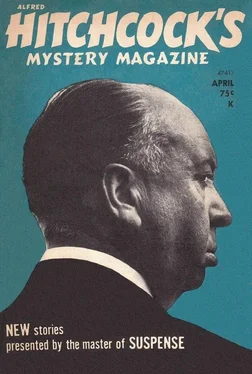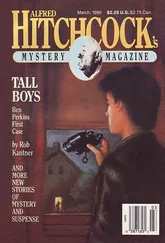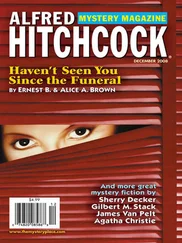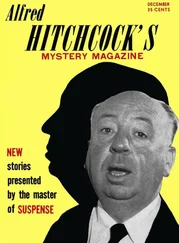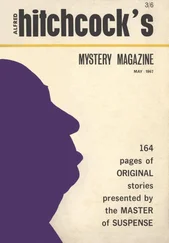Роберт Колби - Alfred Hitchcock’s Mystery Magazine. Vol. 17, No. 4, April 1972
Здесь есть возможность читать онлайн «Роберт Колби - Alfred Hitchcock’s Mystery Magazine. Vol. 17, No. 4, April 1972» весь текст электронной книги совершенно бесплатно (целиком полную версию без сокращений). В некоторых случаях можно слушать аудио, скачать через торрент в формате fb2 и присутствует краткое содержание. Город: Riviera Beach, FL, Год выпуска: 1972, Издательство: H.S.D. Publications, Жанр: Детектив, на английском языке. Описание произведения, (предисловие) а так же отзывы посетителей доступны на портале библиотеки ЛибКат.
- Название:Alfred Hitchcock’s Mystery Magazine. Vol. 17, No. 4, April 1972
- Автор:
- Издательство:H.S.D. Publications
- Жанр:
- Год:1972
- Город:Riviera Beach, FL
- ISBN:нет данных
- Рейтинг книги:5 / 5. Голосов: 1
-
Избранное:Добавить в избранное
- Отзывы:
-
Ваша оценка:
- 100
- 1
- 2
- 3
- 4
- 5
Alfred Hitchcock’s Mystery Magazine. Vol. 17, No. 4, April 1972: краткое содержание, описание и аннотация
Предлагаем к чтению аннотацию, описание, краткое содержание или предисловие (зависит от того, что написал сам автор книги «Alfred Hitchcock’s Mystery Magazine. Vol. 17, No. 4, April 1972»). Если вы не нашли необходимую информацию о книге — напишите в комментариях, мы постараемся отыскать её.
Alfred Hitchcock’s Mystery Magazine. Vol. 17, No. 4, April 1972 — читать онлайн бесплатно полную книгу (весь текст) целиком
Ниже представлен текст книги, разбитый по страницам. Система сохранения места последней прочитанной страницы, позволяет с удобством читать онлайн бесплатно книгу «Alfred Hitchcock’s Mystery Magazine. Vol. 17, No. 4, April 1972», без необходимости каждый раз заново искать на чём Вы остановились. Поставьте закладку, и сможете в любой момент перейти на страницу, на которой закончили чтение.
Интервал:
Закладка:
At dusk, as thunder cracked and rain pelted down in blinding sheets, the trouble came in the form of whirling, funnel-shaped clouds.
One tornado ripped through a mobile-home court, killing five people. Another flattened every structure in a whistle-stop on the St. Louis-San Francisco Railway, and a third blew a sedan off a county road, fatally injuring its occupant.
At least a dozen funnel clouds had been sighted by 9:08 p.m., at which time a tall, dark-haired woman walked from the kitchen of a remote farmhouse into the parlor. She thought she’d heard a car in the front yard. Her imagination, probably. Nobody in his right mind would be out driving on a wild night like this.
She started toward a window, but never made it.
Someone kicked the front door open, springing the lock, and two men stumbled in. Both carried pistols.
The taller and older of the two swung the bore of his weapon toward the young woman’s midsection and said, “Freeze, lady. Anyone else in this house?”
Wordlessly, she shook her head.
“Okay. You can sit down now. But be nice and quiet, and keep your hands at your sides.”
Slowly, she eased into a chair.
The room’s only light came from kerosine lamps. The power had gone out long ago. From the kitchen, music wafted faintly from a transistor radio.
The two intruders, bareheaded, with crew cuts, were dressed in soaking wet blue denim uniforms.
“Jerry, close that door,” the older man ordered. “Then see if there’s anyone else here. She might be lying.”
Jerry, a thin, short youth of about twenty, hesitated a moment to stare at the young woman. Her features were plain but she was well-built, with a robust figure quite clearly defined under a sleeveless blouse and fashionably brief shorts. Then he slammed the front door, braced it with a table and took off to search the house.
The other man walked around behind the woman. He had broad shoulders, a flat belly, a hawklike profile and dark rings under eyes that burned with an abnormal intensity. His age could have been anywhere between thirty-five and fifty.
Placing the pistol’s muzzle to the woman’s head, he asked, “What’s your name?”
“Karen.” Terrified, she worked hard at keeping her voice steady. Her intuition told her that any display of panic might trigger violence against her person. “Karen Smallwood.”
“Who lives here with you?”
“I don’t live here. My parents do, but they’re away. I’m a teacher — I live in town. I came out to straighten up for them but got caught by the storm.”
“We’re lost. We were on County B, headed for Hanksville and the Interstate, when we hit a washout. We had to detour onto the cowpath that took us here. Where’s it go?”
“Same place as County B — to Hanksville — only it takes a few minutes longer to get there.”
“Any bridges in between?”
“No, there’ll be no more washouts.”
“Driving to this farm, we were going up a hill. What’s on the other side? Another farm?”
“Not right away. Nobody lives within three miles of here.”
“If you been listening to that radio, you must know who we are. Except for the tornadoes, we been the big story on every newscast.”
“Yes,” she said. “I know. I don’t remember your name...”
“Garth,” he said pleasantly. “Ben Garth.”
“You and your friend broke out of prison yesterday. The police in half the country are looking for you.”
She didn’t bother adding what they both knew very well: that Garth had been serving a sentence for murder, Jerry for rape; that since breaking out, they had shot and killed a motorist whose car they had stolen, and then beaten a waitress to death in a roadside diner. The newscaster had termed it a “senseless killing spree.”
Jerry came back. “There’s nobody else,” he reported, “but I found this.”
He held a faded photograph of Karen, then a leggy teen-ager, and a middle-aged couple. The man in the picture wore a state police uniform.
“The cop your father?” Garth asked.
“Yes,” she admitted. “But he isn’t a trooper anymore. He was hurt chasing a speeder, so they pensioned him off.”
“Where are your folks now?”
“A flea market in Canton, Texas. They won’t be back until next week.”
“A what?”
“Flea market,” she repeated. “A place where anyone can go and sell anything. My folks barely make out on my father’s pension. As a sideline, they sell antiques. Just look around...”
Garth scrutinized the home’s interior more closely. She was right. The parlor and dining room looked more like an antique store than a farmhouse. Pictures in Victorian frames hung from the walls; shelves and cupboards were filled with china and glassware; and the floor areas were jammed with heavy old chairs and tables.
“You’re pretty cool about all this,” Garth said. “I admire women who don’t lose their heads and start hollerin’, like the one in the diner this mornin’ — the one we had to shut up...”
He didn’t admire her. He was probing, wondering how much she could take.
“There’s no point in screaming,” Karen said as casually as she could, “if nobody but you two would hear.”
“Smart girl. Just in case the storm gets worse, you got a storm cellar in this place?”
“The door’s in the kitchen floor.”
Jerry went to the kitchen, lifted the door and swung a kerosine lantern down for a better look. “It’s no fancy hotel,” he called back, “Taut we could sweat it out if we had to.”
“Any guns in this house?” Garth went on. “If your old man was a cop, he must have some guns.”
“Two hunting rifles, a shotgun and two revolvers,” she replied without hesitation. “They’re locked in a case upstairs. My father has the key, but if you want them you can just break the glass.”
“We’ll take ’em when we leave.”
“You were wise,” Karen said, “ditching your car to find shelter. A car’s the worst place to be if a twister hits.”
She said that to get Garth’s mind off guns. She didn’t want him thinking about guns because there was one she hadn’t mentioned, an ancient, double-barreled shotgun hanging in plain sight on the wall over the mantel in the dining room.
Apparently, it was now nothing more than a decorative but useless antique; it hung so high that to get it, she’d have to climb up on a chair to lift it off its brackets.
While it was antique it was not useless, however. Despite its age it was loaded and in perfect working condition. That old shotgun, her father had said, would be his ace in the hole. He hoped he’d never need it, but as a former law officer living far out in the country, and knowing some men held grudges against him, he wanted an emergency weapon.
At the moment, though, it seemed the shotgun would not do Karen much good. It was difficult to imagine the circumstances under which Garth would allow her to climb the chair, reach up and turn the weapon on her captors...
Garth took the pistol away from Karen’s head and jammed it under his belt. “Okay,” he drawled, “we ain’t ate since mornin’ and I never been fed by a lawman’s daughter before. So you just haul into that kitchen and fix us somethin’ — fast.”
The men drank beer and watched her every move as she prepared a quick supper of frankfurters and canned beans. As they ate, they made her sit across the dining-room table from them — the shotgun on the wall behind them.
When they were through, Karen cleared the table and brought more beer. On the radio, the announcer reported the sighting of more funnel clouds.
“I don’t suppose,” Karen said, settling back in her chair, “either of you has ever seen a tornado.”
Читать дальшеИнтервал:
Закладка:
Похожие книги на «Alfred Hitchcock’s Mystery Magazine. Vol. 17, No. 4, April 1972»
Представляем Вашему вниманию похожие книги на «Alfred Hitchcock’s Mystery Magazine. Vol. 17, No. 4, April 1972» списком для выбора. Мы отобрали схожую по названию и смыслу литературу в надежде предоставить читателям больше вариантов отыскать новые, интересные, ещё непрочитанные произведения.
Обсуждение, отзывы о книге «Alfred Hitchcock’s Mystery Magazine. Vol. 17, No. 4, April 1972» и просто собственные мнения читателей. Оставьте ваши комментарии, напишите, что Вы думаете о произведении, его смысле или главных героях. Укажите что конкретно понравилось, а что нет, и почему Вы так считаете.
